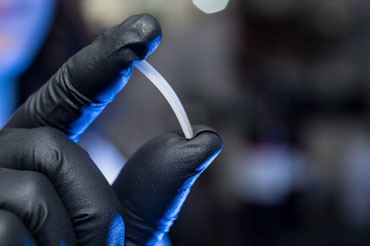Can Plastic Be Recycled Over and Over Again
A new kind of plastic tin break down into the same edifice blocks from which it was fabricated. Similar a child's plastic Lego bricks, the molecular blocks tin can link and detach again and again, a new study finds. And the material is more durable than earlier plastics designed to be recycled more than once.
Maybe y'all've learned to throw plastic bottles and containers into a recycling bin rather than the trash. News flash: Today, only near 10 percent of plastic ever gets recycled. That's according to a 2022 report in Science Advances. Most of the residual lingers in landfills or ends up floating in the ocean. Merely plastic is and then cheap and useful that hundreds of millions of tons more than of it are fabricated each year.
Even plastic that does get recycled will likely reach the landfill shortly. That's considering nearly plastics today don't turn back into their starting textile. Instead, they pause down into molecules that can't be reused right away. Rather than pulling a Lego cosmos apart into its starting blocks, it might be more like dandy the construction into bits.
Transforming those $.25, now, into something useable can take many chemical reactions. All that extra processing uses fourth dimension, h2o and energy. Those steps make recycling not very efficient. And few recycled plastics are remade into the aforementioned type of object they were before. Instead, most get turned into items such as carpeting, motorcar parts and park benches — things that themselves are hard to recycle. But a plastic that could easily pause downwardly into its building blocks and be reused over and over? That could greatly assistance cut the global plastic-waste product problem.
Explainer: What are polymers?
Michael Shaver is a pharmacist at the University of Edinburgh in Scotland. He studies plastics but wasn't role of the team that fabricated the new material. Designing a reusable plastic is a balancing act, he says. That's because plastics are a type of polymer. Polymers are long chains of small molecules chosen monomers (MAH-nuh-merz). Those small starter molecules link together like beads on a string.
To be good for making polymers, the monomer building blocks should be adequately easy to connect. Monomers that need extreme temperatures or besides much chemical coaxing to link upwardly might non be practical. What's more than, the end polymers tin can't be brittle or fall apart likewise easily, Shaver notes. They need to be stable at a high plenty temperature to exist used. Pouring a hot drinkable into a plastic loving cup? You don't want information technology to weaken the chains and melt the cup into a sticky puddle.
Rigid and reversible
Polymer pharmacist Jianbo Zhu and his colleagues fix out to solve this challenge. They work at Colorado Country Academy in Fort Collins. The team previously made a polymer that could be cleaved downwardly into its starting molecules. Only the resulting plastics weren't usable. They were too soft and temperature-sensitive.

This new type of plastic material tin intermission down into its original building blocks more easily than current plastics. Information technology has the consistency of a dispensable plastic bottle.
Beak Cotton/Colorado State Univ.
This fourth dimension, Zhu and his colleagues started with one of their previous creations. The monomer'southward atoms were arranged in a band shape. And so they added a second ring of atoms in a way that braced the molecule into a rigid form. That rigidity helped the monomers link together. These quickly assembled into polymer bondage at room temperature. And the bondage were stable even when heated upwards. The team reported its results Apr 26 in Science.
Particularly important, the process was reversible. Certain mild chemicals or actually high heat broke the polymers apart. And they broke downward into the same initial monomers. The researchers were able to repeat this bicycle several times. Link, snap, link, snap. In theory, they say, the polymer could be infinitely recyclable.
The same chemic recipe tin can make either of two monomer shapes. Mixing the two monomers together created an even stronger plastic, reports Zhu.
"This is probably the best system out there," Shaver says.
Still, information technology'south not perfect yet. Zhu and his colleagues program to go on tinkering with the monomer's design. They desire the resulting plastic to be a scrap less brittle. Someday, they hope to have a production that tin can be sold.
parkerhimmenting76.blogspot.com
Source: https://www.sciencenewsforstudents.org/article/plastic-can-be-recycled-over-and-over-and-over

0 Response to "Can Plastic Be Recycled Over and Over Again"
Post a Comment